 |
bostonbubble.com
Boston Bubble - Boston Real Estate Analysis
|
|
SPONSORED LINKS
Advertise on Boston Bubble
Buyer brokers and motivated
sellers, reach potential buyers.
www.bostonbubble.com
YOUR AD HERE
|
|
DISCLAIMER: The information provided on this website and in the
associated forums comes with ABSOLUTELY NO WARRANTY, expressed
or implied. You assume all risk for your own use of the information
provided as the accuracy of the information is in no way guaranteed.
As always, cross check information that you would deem useful against
multiple, reliable, independent resources. The opinions expressed
belong to the individual authors and not necessarily to other parties.
|
| View previous topic :: View next topic |
| Author |
Message |
admin
Site Admin
Joined: 14 Jul 2005
Posts: 1826
Location: Greater Boston
|
 Posted: Fri Oct 02, 2009 2:31 am GMT Post subject: Boston Bubble Brief: The Real Story for MA - Aug 2009 Posted: Fri Oct 02, 2009 2:31 am GMT Post subject: Boston Bubble Brief: The Real Story for MA - Aug 2009 |
 |
|
This is a brief report on what the data for the housing market in Massachusetts looks like in real terms. Market data is typically reported in nominal terms which can be misleading because it combines changes in housing values with changes in the value of the dollar. Correcting for inflation removes changes in the dollar as a factor and gives a more accurate picture of how housing values have changed. This report is based on the published data of the Massachusetts Association of Realtors, though it should be noted that the S&P/Case-Shiller Index is a superior data source.
The Massachusetts Association of Realtors released their data for August 2009 on Tuesday, September 29th. While the raw prices were provided in nominal terms, for this report they have been adjusted for inflation using the CPI Northeast Urban numbers available at http://www.bls.gov/cpi/ Adjusting for inflation produced the data represented by the graphs below. Prices for January 2003 and earlier have been estimated by applying the earliest reported median from The MAR, February 2003, against the S&P/Case-Shiller Index for the Boston area. Suggestions for improving this estimate are welcome.
Full Price History
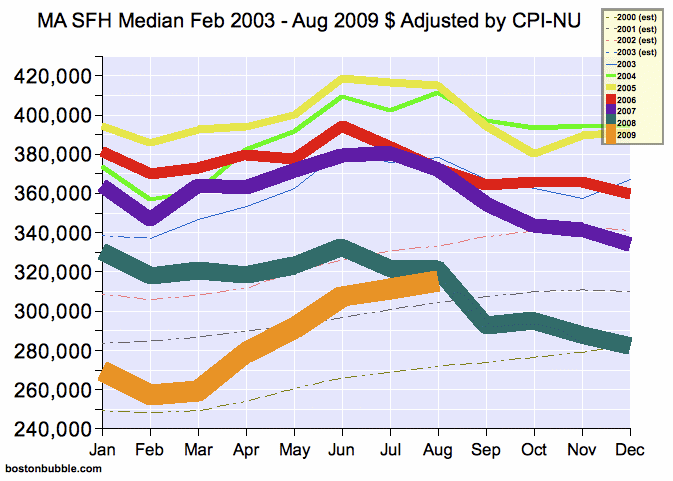
Change in Median Price From One Year Earlier, February 2004 - August 2009
Seasonal variations are removed by comparing prices from the same month in the prior year.
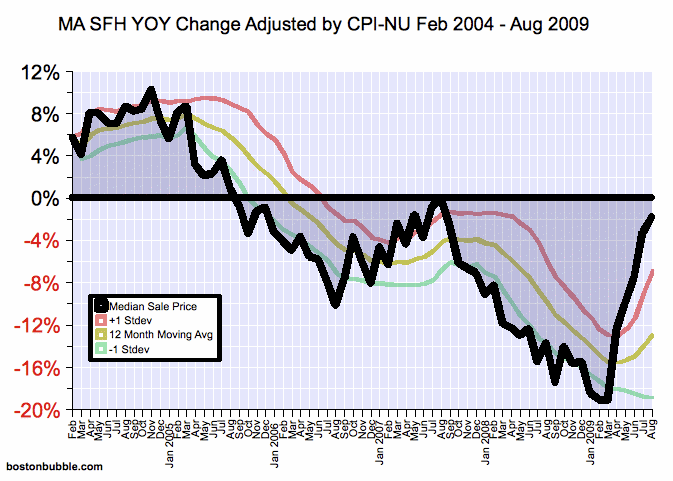
Some observations:
- The real decline from August 2008 to August 2009 was 1.86%
- For the fifth month in a row, the year over year decline was above the normal range, with April being the first time since August 2007 that the decline has been one standard deviation or more above the moving average. This continues the abrupt departure from ever deepening declines which began in April and suggests that declines may be moderating.
- Real prices are once again lower than the same month in any other year in the time period covered by The MAR.
- Prices are now 24.73% below the peak set in June 2005. This is the result of a 15.72% decline in nominal housing prices and a 10.69% decline in the purchasing power of the dollar.
- The cumulative price decline from the beginning (Feb 2003) is 6.59%, which is an annualized decline of 1.04%.
- The price is above the estimate for the same month in 2001 for the third time since dipping below it last September.
Inflation has played a large part in this year's spring bounce. The year over year change in the CPI-NU was actually negative for the last five months, making the real decline in housing prices smaller than what has been reported by the media. This effect will be temporary, though, as the year over year decline in consumer prices is the result of a deflationary spike from last fall which has already run its course, as can be seen from the following graphs:
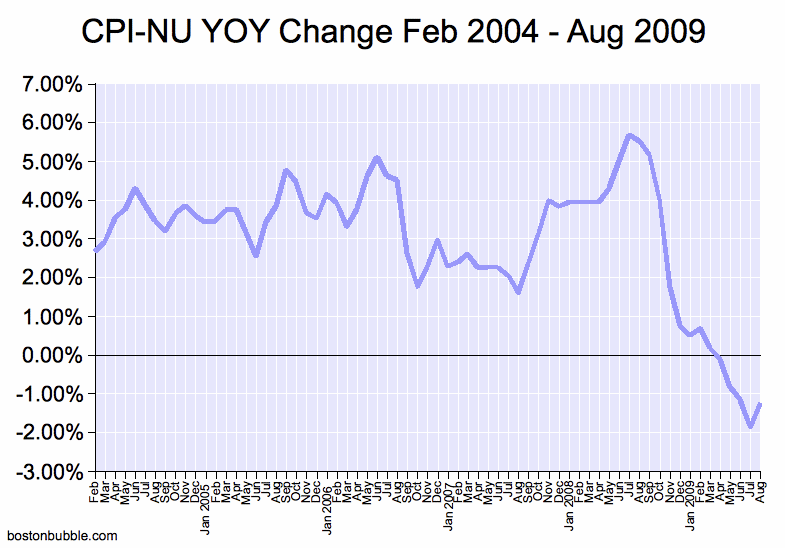
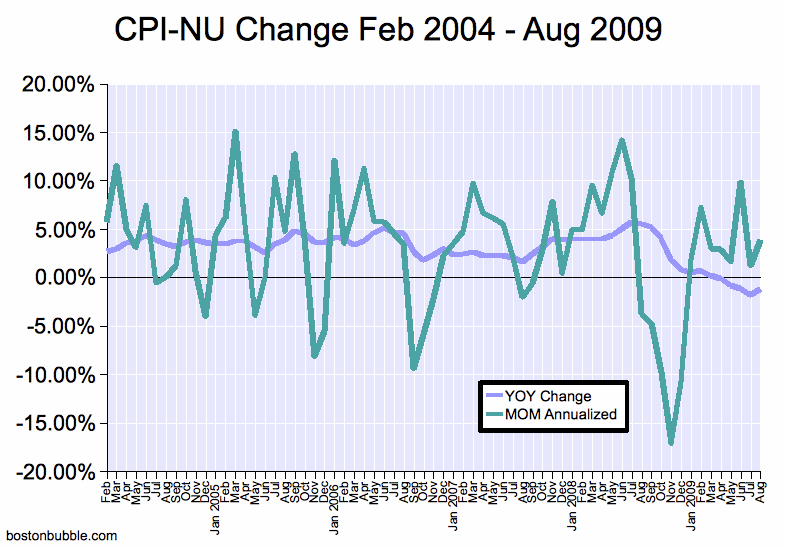
The temporary $8,000 US tax credit for home buyers has also likely distorted this year's spring bounce. At the most basic level, it plausibly added $8,000 to the price of homes near the Massachusetts median. However, its side effects may have been just as important, if not more so, in producing the appearance of a particularly large spring bounce. The tax credit in conjunction with the Massachusetts program to facilitate its use as a down payment surely expanded the pool of potential buyers to people who would have otherwise not been able to buy due to an insufficient down payment. In fact, the increased demand from people rushing to not miss out on $8,000 in savings could very well have (artificially) bid prices up by quite a bid more than $8,000 because of all the extra buyers.
The tax credit also probably caused a time shift of home purchases which would have been made anyway, pulling demand from the beginning of 2009 as well as next year and swelling demand this spring, summer, and fall. Depressed demand in the winter would have lowered prices there and increased demand in the spring and summer would have increased prices there, and so the apparent rise from winter to summer is artificially steepened. Finally, those who purchased before the credit took affect may have mentally discounted their offer prices to make up for the credit they would be missing.
Strong evidence for this hypothesis can be seen in the tiered S&P/Case-Shiller Index for Boston. The bounce is very pronounced in the low tier, where the credit would have the most impact, and practically absent in the high tier, where it would be a smaller percentage of the price and where many buyers would presumably be disqualified from the credit due to the associated income limits.
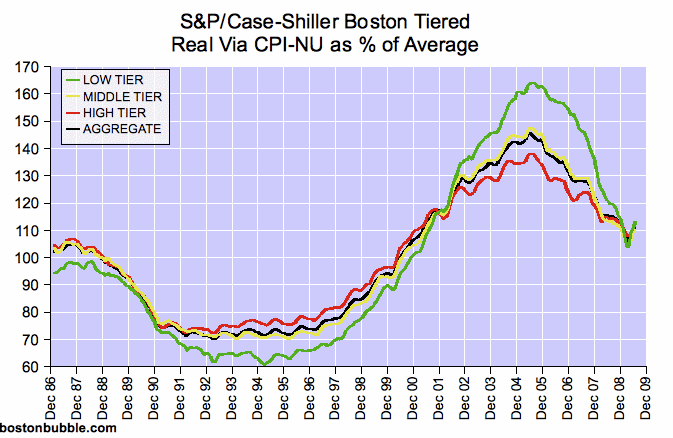
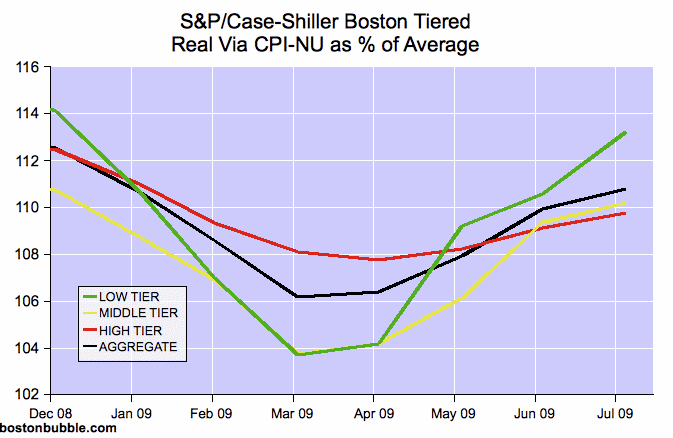
The S&P/Case-Shiller Index for Boston is likely superior to the data above as it corrects for many flaws that are inherent when using only the median price. The S&P/Case-Shiller Index also has the advantage that futures contracts can be traded against it, thereby offering an unbiased insight into where housing prices are expected to be in the future. It also has more extensive historical data available. The MAR data was used for this report mainly out of inertia and might be replaced with the S&P/Case-Shiller Index in future reports.
As usual, please do try this at home. Double checking of the math used to construct the above graphs and analysis is strongly encouraged in order to help ferret out any errors. The data was derived from the following sources:
The text of this post and the associated graphs are Copyright 2009 by bostonbubble.com with all rights reserved, except as stated here. You may reproduce each graph individually or the text of the entire post as a whole (including graphs) under the Creative Commons Attribution-No Derivative Works 3.0 Unported License. You may additionally scale the graphs to fit your work. Alternatively, if you remove the bostonbubble.com signature from the bottom left hand corner of the images within this post, those modified images (and only those modified images) can then be distributed under the Creative Commons Attribution 3.0 Unported License. In all cases, attribution should be made via a hyperlink to http://www.bostonbubble.com/forums/viewtopic.php?t=2279 or http://www.bostonbubble.com/ Quoting excerpts of the text is also allowed provided that the quotes would normally fall under fair use. To request other terms for reproduction, please post your request in the original thread at http://www.bostonbubble.com/forums/viewtopic.php?t=2279
The latest version of this report can be found at http://www.bostonbubble.com/latest.php?id=ma_inflation
- admin |
|
| Back to top |
|
 |
Renting in Mass
Joined: 26 Jun 2008
Posts: 381
Location: In a house I bought in December 2011
|
 Posted: Fri Oct 02, 2009 1:19 pm GMT Post subject: Posted: Fri Oct 02, 2009 1:19 pm GMT Post subject: |
 |
|
| Looks like next month will have a YOY increase. I'm guessing October will too. November and December will be the real story as the tax credit goes away and the effects of the time shift are felt. I'm also starting to think about what will happen to home sales if the flu gets bad. |
|
| Back to top |
|
 |
admin
Site Admin
Joined: 14 Jul 2005
Posts: 1826
Location: Greater Boston
|
 Posted: Fri Oct 02, 2009 1:48 pm GMT Post subject: Posted: Fri Oct 02, 2009 1:48 pm GMT Post subject: |
 |
|
| Renting in Mass wrote: | | Looks like next month will have a YOY increase. I'm guessing October will too. November and December will be the real story as the tax credit goes away and the effects of the time shift are felt. I'm also starting to think about what will happen to home sales if the flu gets bad. |
Yes, a year over year increase for September looks probable. However, by October we will probably be back to a YOY increase for price levels (i.e., positive inflation), so that will be pushing in the normal direction again. Nevertheless, last October was probably depressed by the start of the so called economic crisis, so the bar to beat is low there too, especially since the tax credit will still be in effect.
I agree that it won't get interesting until the tax handout expires. If they end up extending it, it will still get interesting once we get into months that had the tax credit in both 2009 and 2010 since they will be more directly comparable, although I still suspect that a lot of demand will have been time shifted into 2009 since an extension was never a sure thing (and still isn't, thankfully). On the other hand, there is also talk of expanding the credit to $15K and removing the income limits (great - let's all subsidize the rich even more), which would continue to mess up the year over year comparison on 2010.
- admin |
|
| Back to top |
|
 |
john p
Joined: 10 Mar 2006
Posts: 1820
|
 Posted: Fri Oct 02, 2009 2:31 pm GMT Post subject: Posted: Fri Oct 02, 2009 2:31 pm GMT Post subject: |
 |
|
Bring out your dead. Bring out your dead.
http://www.youtube.com/watch?v=grbSQ6O6kbs
Although I like how you break down the 24.74% price decline into decline in nominal hosing and decline of purchasing power of the dollar and highlight the impact of the $8k down payment grant for first time home buyers, I think that it is important to note that mortgage rates did really drop for a period of time there in the Spring and that on top of $8k really had a big impact.
I think you've explained how your metric absorbs the mortgage rates to some degree because inflation parallels mortgage rates for the most part. Did I remember that right?
Keep in mind that the Dollar is a unit of measure.
The other point has to do with value. Lets just say someone is 6 feet tall and that person equals a house that is worth $600k. Now what if the person doesn't shrink, but they change the unit of measure so that 1 foot is now equal to 10 inches instead of 12 inches. Now the guy didn't get smaller but he now measures 7'-2.5". That house that was $600k is now $725.
What is more mature, the local market balance or the US Dollar?
In Massachusetts we have an income structure and a house price structure. Basically people typically buy the nicest property in the nicest location that they can comfortably afford. Sometimes the price and quality doesn't exactly line up because the income distribution and the housing stock quality distribution don't align. It's like a forced curve that the teachers use. Now what if the range of scores on a test went from a 55 to a 51. Should the kids who got a 55 get an A and the kids who got a 51 get an F? Just as that isn't fair because they really weren't that far apart, the prices of homes in Massachusetts don't reflect quality as much as they represent the distribution of incomes. Despite my rants about how people overpay for houses simply because they can with their incomes, the relationship of incomes to house prices is a mature market in my mind. Of course prices backslid for a while, but the same top 25% of income earners were buying the same 25% of the most expensive housing stock.
I believe, however, that it is the US Dollar that is now subject to deformation. In a home purchase you're not only buying a property, but you're buying dollars at a particular unit of measure
I am bringing this up because I am confused about the direction of where I assume mortgage rates will go. I am not an expert in this and most of what I've read suggests that hyperinflation will increase the interest premium and therefore interest rate to loans. There is a thought in the back of my mind, however that suggests that rates might go lower. It is such a foreign notion to my assembly of thinking that I'm telling myself to shut up but I want to just game out how that actually might be possible.
The reason why this might be possible is that perhaps although the unit of measure might be different, the guy is still 6' tall at the old measure and the market is somewhat mature. I think although the dollar might deform, the maturity and value of the housing market in Boston might make the values stable.
My thinking in the dialogue of unit of measure and actual value and market isn't formulated very much but I'd wonder what other's thoughts are. |
|
| Back to top |
|
 |
john p
Joined: 10 Mar 2006
Posts: 1820
|
 Posted: Fri Oct 02, 2009 2:34 pm GMT Post subject: Posted: Fri Oct 02, 2009 2:34 pm GMT Post subject: |
 |
|
Oh, another thought....
Say in Massachusetts kids scored in a range of 55 to 51 on a test, and the kid who got 55 got an A and the kid who got a 51 got an F.
Now lets say that in Tennessee the range was 45 to 41, and the kid who got a 45 got an A and the kid who got a 41 got an F.
The kid who got an F in Massachusetts would have gotten an A in Tennessee. |
|
| Back to top |
|
 |
admin
Site Admin
Joined: 14 Jul 2005
Posts: 1826
Location: Greater Boston
|
 Posted: Fri Oct 02, 2009 3:04 pm GMT Post subject: Posted: Fri Oct 02, 2009 3:04 pm GMT Post subject: |
 |
|
| john p wrote: | I think that it is important to note that mortgage rates did really drop for a period of time there in the Spring and that on top of $8k really had a big impact.
...
I am bringing this up because I am confused about the direction of where I assume mortgage rates will go. I am not an expert in this and most of what I've read suggests that hyperinflation will increase the interest premium and therefore interest rate to loans. There is a thought in the back of my mind, however that suggests that rates might go lower. It is such a foreign notion to my assembly of thinking that I'm telling myself to shut up but I want to just game out how that actually might be possible.
|
Excellent point. Today's still high prices are entirely predicated on historically low interest rates. Very low mortgage rates are a necessary condition for current price levels. Prices will likely be much lower if mortgage rates return to anywhere near the historic average. Furthermore, declining mortgage rates help make year over year numbers higher than they would otherwise be.
Here too the support is manufactured by the government and is set to end soon. The Fed has been buying mortgage backed securities which has been driving rates down, and last I read they were planning to wind this down in 2010 Q1. That will put upward pressure on rates. What factors are there which would put downward pressure on rates? For the last several years, it has been China, et al, buying US debt which has pushed rates down to historic lows. Will they continue to increase their purchases (pushing rates down)? To hear Chinese officials speak, I would expect the exact opposite.
Rates are at historic lows. I don't see them staying this low for much longer. I think we will be paying the price for today's "quantitative easing" with much higher rates tomorrow. I could be wrong, so I would love to hear any arguments for why rates will go even lower or even how they can remain at current levels. (Wholesale socialization of the housing market might be one possible way, though I'm not sure the government could afford it.)
As for your query as to whether the local housing market might be fairly valued and it is just the dollar which is out of whack, that is certainly a possibility to consider. However, I don't think that's the case since incomes would be aligned with prices in that scenario, and they weren't at last check.
- admin |
|
| Back to top |
|
 |
Renting in Mass
Joined: 26 Jun 2008
Posts: 381
Location: In a house I bought in December 2011
|
 Posted: Fri Oct 02, 2009 4:00 pm GMT Post subject: Posted: Fri Oct 02, 2009 4:00 pm GMT Post subject: |
 |
|
talk of expanding the credit to $15K and removing the income limits
That would be insane... so that's probably what will happen.
Rates are at historic lows. I don't see them staying this low for much longer. I think we will be paying the price for today's "quantitative easing" with much higher rates tomorrow. I could be wrong, so I would love to hear any arguments for why rates will go even lower or even how they can remain at current levels.
The only theory I've heard for how rates could remain at the current levels is a deflationary spiral, which would be worse than inflation and the rising rates that would follow. There was a great Dilbert comic recently where the CEO said they had a choice between a death spiral and and a slow slide to oblivion. That's pretty much where we're at. |
|
| Back to top |
|
 |
john p
Joined: 10 Mar 2006
Posts: 1820
|
 Posted: Fri Oct 02, 2009 4:05 pm GMT Post subject: Posted: Fri Oct 02, 2009 4:05 pm GMT Post subject: |
 |
|
Some great characters on this site  |
|
| Back to top |
|
 |
Phil O. Math
Guest
|
 Posted: Sat Oct 03, 2009 4:18 pm GMT Post subject: cash for trash Posted: Sat Oct 03, 2009 4:18 pm GMT Post subject: cash for trash |
 |
|
I see the $8k 1st-time homebuyer rebate, combined with historically low mortgage rates, as comparable to the 'cash for clunker' program. On a smaller scale.
The cash for clunkers time-frame was brief and the size of the subsidy was very large relative to the purchase price of the car when you compare it to the 1st-time homebuyer rebate program. But the effect is the same.
After the cash for clunker program ended, September auto sales were the worst in like 30 years. The same will happen to home sales if the rebate expires and/or if mortgage rates rise even a percent or 2 (still below historic averages).
Mind you, I think there is a strong chance that the rebate program is extended or increased. It's insane but, hey, it's no more insane than the deductibility of mortgage interest. |
|
| Back to top |
|
 |
|
|
You can post new topics in this forum
You can reply to topics in this forum
You cannot edit your posts in this forum
You cannot delete your posts in this forum
You cannot vote in polls in this forum
|
Forum posts are owned by the original posters.
Forum boards are Copyright 2005 - present, bostonbubble.com.
Privacy policy in effect.
Powered by phpBB © 2001, 2005 phpBB Group
|








